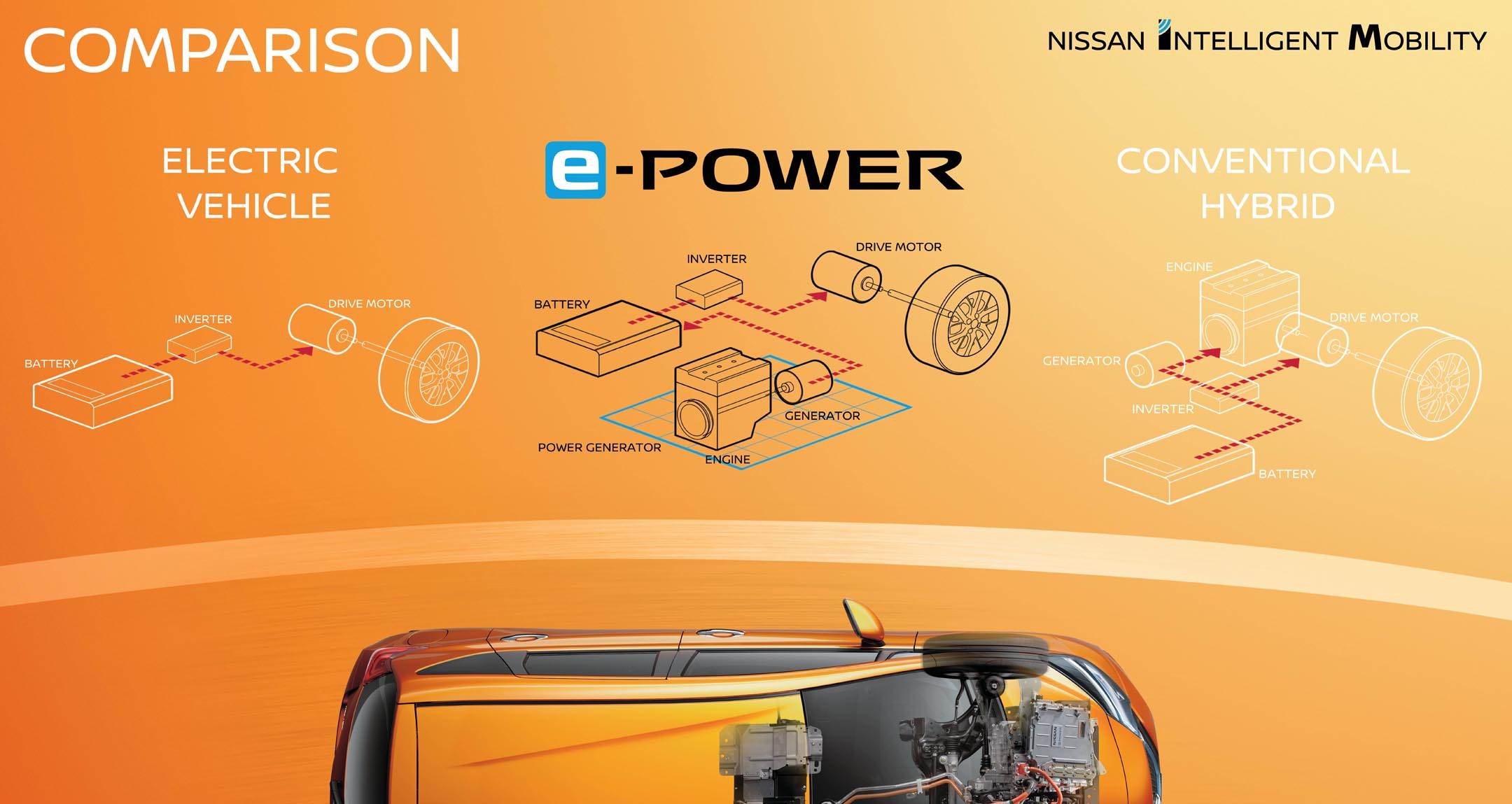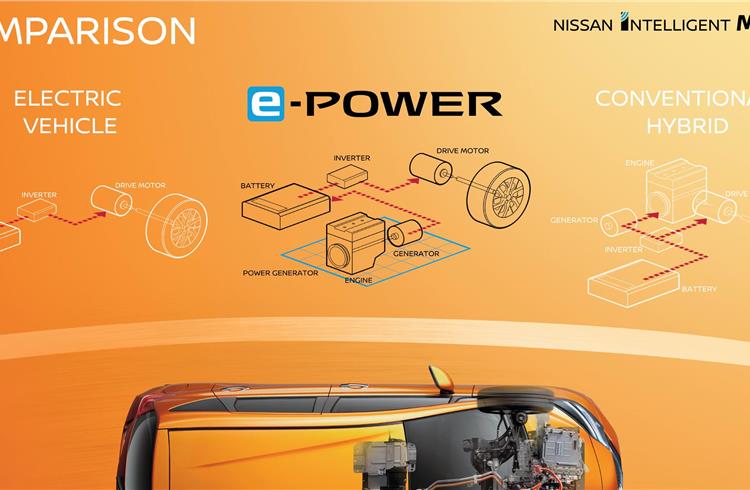Nissan moots Note e-Power range extender for India, Renault calls for more clarity on EV policy
The government’s ambitious move to go all-electric by 2030 sees Nissan evince interest in enabling green motoring through a range extender model; Renault India pushes for development of EV-friendly infrastructure.
Japanese carmaker Nissan is studying the possibility of introducing the Note e-Power range-extended electric vehicle (EV) in India. The carmaker feels that this electrically driven hatchback, which is charged by a small 1198cc petrol engine (range extender) rather than a fixed charging socket, will be better suited for the Indian buyer.
“The e-Power technology will be very convenient for the Indian customer. We have a request from our team in India to study the e-Power technology for the country,” Daniele Schillaci, executive vice- president, Global Marketing and Sales, Nissan Motor Co, said addressing the media at the company’s headquarters in Yokohama.
Launched in Japan last year, the Note e-Power is the automaker’s first range-extended electric vehicle. It can run on petrol like a normal petrol-powered or hybrid car, without having to charge the battery from a charging station, thus making it suitable for countries like India where the electric vehicle charging network is weak.

The Note was the second best-selling vehicle in Japan in the first half of 2017. It even emerged as the top seller in January with the e-Power accounting for more than 70 percent of the overall Note sales, according to reports. Thanks to the upbeat response, the carmaker is keen to replicate the success of the vehicle in other countries.
Schillaci also confirmed that Nissan is gearing up to launch a pilot run of its all-electric vehicle, Leaf, in India to study its viability. “I can confirm that we are starting a deep test of the new Leaf in India this year. So, in terms of strategy, the Note e-Power and the Leaf are the two things we are studying,” he added.
The new Leaf is powered by a 40kWh battery (up 10kWh from the previous-gen vehicle) and makes 140hp (up 40.4hp from the current 30kW range-topper). At launch, claimed range for the Leaf will be 400km (up by 280km) under the Japanese driving cycle, 380km (up by 129km) under New European Driving Cycle and around 241km (up by 172km) for the US market.
The carmaker undertook a survey which revealed that once an EV’s range is above 300km, a customer’s range anxiety drops significantly. “As long as you are above 300km, the range isn’t an issue anymore. After that, what is important is that the car has to possess technology that makes a customer feel different,” Schillaci said.
At the unveiling of the second-generation Leaf on September 6, Nissan confirmed that a high-performance model with a greater battery capacity will join the standard model in 2018. According to Schillaci, the Leaf will have a range of “beyond 225 miles (362 km)” under most stringent US EPA regulations.
Electric vehicle strategy for India
The Indian government has revealed a push for widespread adoption of EVs in the country and outlined an ambitious target to sell only EVs after 2030. Placing further emphasis on the plan, road transport and highways minister, Nitin Gadkari recently sent out a stern message to automakers urging them to switch to alternative fuel saying he will not mind "bulldozing" them to curb pollution.
Backed by a wealth of experience in electric vehicles, Nissan aims to participate in the Indian government’s push for large-scale adoption of EVs. “The Indian government has made a big statement that from 2030 it wants to sell only electric vehicles. While 10 years looks far away, in the industry 10 years is just a long term. We would like to share our experience with the local authorities not only in terms of products but also infrastructure,” said Schillaci.
Renault India chief calls for clarity on EV policy
Meanwhile, according to Renault India, the government has to put in place a clear policy and get the requisite infrastructure ready to enable automobile manufacturers prepare for the proposed switch to EVs. Further, to fight pollution successfully, old cars need to be phased out for electric cars to give the desired result, Renault India managing director Sumit Sawhney has said.
"Electric is the future. It is inevitable. The question is what is going to be the timing," he told PTI, when asked about Union Minister Nitin Gadkari's message to auto industry to prepare for alternative fuels else he would 'bulldoze' them.
Sawhney, however, said it is critical to know the timeline for the planned switch to EVs. "If they (government) want it to come fast, then they need to start creating infrastructure, clear policy, ecosystem and then you need to move towards that direction," he added.
Highlighting the need to phase out old polluting vehicles, he said, "You can't have electric cars and also 25- year-old cars, which are creating pollution. That is why, in order to create future, you need to take care of the past as well."
When asked if the company was prepared to launch EVs in India, he said: "We have cars in our global portfolio but for the Indian market we need to adapt them to the local conditions. We have our R&D centre and that should not be a problem."
However, before that there has to be a policy on EVs so that the industry is clear about the road-map, Sawhney added.
While Renault India plans to continue with its plan to launch a new model every year, Sawhney lamented the frequent changes related to the auto sector, saying "non-stability of policies is something which is not good".
"We had huge deliberations before the launch of GST and cess and then within 45 days of launch, we are again talking about changing the cess and redefining definition of luxury. For me any car which is more than 4 metres is not luxury," Sawhney said.
He added, "All seven-seaters are not luxury cars, some of them are people-movers for the common man. So I clearly look forward to more stable policies.”
RELATED ARTICLES
Bosch hydrogen engine tech-powered truck to be on Indian roads this year
The global supplier of technology and services is betting big on both electromobility and hydrogen. While announcing the...
IIT Bombay inaugurates Arun Firodia Research Floor
IIT Bombay, one of India’s top technical and research institutions, honours Kinetic Group chairman Dr Arun Firodia, one ...
Maruti Suzuki expands capacity at Manesar plant by additional 100,000 units
New assembly line at Plant A expands total manufacturing capacity at the Manesar plants to 900,000 units per annum. Alon...





 10 Sep 2017
10 Sep 2017
 6922 Views
6922 Views





 Autocar Pro News Desk
Autocar Pro News Desk




